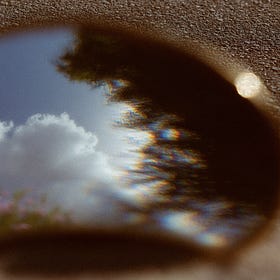There are mornings when I wake and feel the day waiting like an open door, when words arrive before I've even thought to call them, when my body moves with an ease I forget I'm capable of, when the simplest gestures feel fluid as water finding its course. And then there are the other days, when the coffee grows cold while I stare at nothing, when each small task looms like a mountain, when I feel like I'm moving through invisible honey, every motion requiring effort I don't have to give.
The difference between these days has nothing to do with virtue or discipline or the quality of my intentions. It is something far more mysterious and immediate: the invisible force that determines not just what I accomplish, but who I am capable of being.
We speak of energy as though it were fuel—something to manage, to optimize, to hack. But living inside a body teaches you that energy is more like weather: it has its own seasons, its own sudden storms and unexpected clearings. You cannot sustainably summon it through willpower alone any more than you can will the sun to rise. You can only learn to read its signals, to notice when the wind shifts, to honor what each moment makes possible.
I think of those afternoons when creativity moves through me like electricity through wire—when ideas connect faster than I can write them down, when the page becomes a place of discovery rather than struggle. In those hours, I am not the same person who sits paralyzed before an empty screen at midnight, wrestling with sentences that refuse to come. Same mind, same hands, same heart—but riding an entirely different wave of vitality.
This is what we miss when we treat ourselves as fixed entities. We are not one person, but many, cycling through versions of ourselves as naturally as tides. The self that greets the morning light carries different possibilities than the self that stumbles through the 3 p.m. fade. The person who finds clarity in movement is not the person who thinks best in stillness. We are plural, fluid, constantly becoming—and the underlying force determines which version of us rises to meet each moment.
William James understood this when he wrote that experience is "what I agree to attend to." Attention, he knew, was not just focus—it was the very foundation of who we become. But attention itself rises and falls with the tides of vitality. When energy flows, we can attend to what matters. When it ebbs, even the most important things slip through our fingers like water.
This recognition shaped entire civilizations long before we had words for circadian biology or neurotransmitter cycles. Consider the medieval monasteries: their daily structure wasn't arbitrary but reflected deep observation of human capacity. Matins at dawn caught the mind at its clearest, when prayer and contemplation could penetrate most deeply. The midday hours were reserved for manual labor, when the body's strength peaked. Evening prayers coincided with natural reflection, as daylight faded and the soul turned inward. These weren't just religious traditions—they were sophisticated maps of human energy, refined over centuries of careful attention.
Agricultural societies developed even more nuanced understanding. Agrarian cultures around the world understood that certain tasks required seasonal energies: heavy fieldwork aligned with summer's abundance, while winter's introspection was perfect for storytelling, planning, and craft work. Many Indigenous traditions developed intricate understandings of daily and seasonal rhythms—sophisticated maps of when the land, the body, and the spirit were most receptive to different kinds of work. They understood that forcing action against these natural ebbs and flows led to exhaustion and poor results.
Our modern world has forgotten this ancient wisdom, believing we can stay lit at all hours, caffeinated through every lull, constantly available to every demand. We flood our evenings with blue light, push through exhaustion with stimulants, treat the body's signals for rest as inconveniences to override. But the underlying force still runs beneath all our attempts to control it. Ignoring it doesn't make it disappear—it only makes us strangers to our own operating system.
What would it mean to become students of our own energy? To notice, without judgment, when clarity arrives and when it departs? To arrange the important work for when we have the vitality to carry it, and to rest when rest is what the moment offers?
This is not about slowing down or abandoning ambition. This is about precision. About spending our energy like an investor rather than a gambler—studying the landscape, recognizing opportunities, placing our bets when conditions align. The most successful people I know aren't those who work the hardest; they're those who work most intentionally, who have learned to recognize their own peaks and valleys and to align their most important work accordingly.
There is profound leverage in this kind of self-knowledge. When you understand that your creative mind fires brightest in the morning, you stop scheduling back-to-back meetings during those golden hours. When studies suggest our decision quality often drops later in the day, you can plan accordingly rather than forcing important choices during the afternoon fog. When you notice that certain environments or interactions drain you while others restore you, you can design your days to maximize rather than squander your most precious resource.
The goal isn't to optimize ourselves into machines, but to become intimate with our own natural intelligence—to recognize that the body carries wisdom our conscious minds often miss. There are signals always running beneath the surface: subtle shifts in motivation, barely perceptible changes in mental clarity, the quiet messages our nervous system sends about what we need. Learning to read these signals is like developing a sixth sense for our own potential.
This kind of attention requires practice—the slow, deliberate work of becoming fluent in your own language. It means noticing which conversations leave you feeling expanded and which ones drain something essential from your core. It means tracking the subtle difference between the tiredness that calls for rest and the restlessness that calls for movement.
I've been exploring this work more formally by creating a structure for observing these internal shifts—the daily practice of noticing what my particular consciousness needs to flourish. In Week 4 of THE DAILY 5, this becomes the gentle focus: learning to read the quiet signals your body sends, to recognize the patterns that shape your days, to become intimate with the rhythms that govern your own becoming. It's detective work of the most intimate kind, this careful attention to the forces that make us who we are in any given moment.
If you want to explore that practice alongside me and many others, you can get started today for 20% off all annual plans.
I watch the light change throughout the day and remember that I am no different—constantly shifting, moving through cycles I cannot control but can learn to honor. There is a current beneath all things, carrying us forward or holding us still, and perhaps wisdom lies not in fighting it but in learning to read its patterns, to trust its rhythms, to let it teach us who we are capable of becoming in any given moment.
The current flows, and we flow with it—sometimes rushing forward, sometimes floating in calm waters, but always moving toward whatever waits downstream. The art is not to dominate the river, but to learn its ways, and to find our place within its endless becoming.
XO, STEPF
MORE TO EXPLORE 🐆
The 5-minute daily ritual that changed how I think
THE DAILY 5 is a weekly journaling practice for people who want to understand themselves better—but don’t have hours to reflect every day. It’s structured, intentional, and grounded in real self-awar…
who are you when no one's watching?
Robin Williams was one of the most luminous presences of his generation. He walked onto a stage, or into a film, and the atmosphere changed—an electric current passed through the room, pulling people…
when the ground beneath you breaks open
There’s something kind of cruel about the way wisdom works. It refuses to arrive during the easy seasons, when we have space to receive it gracefully. Instead, it waits. It lurks in the margins of our carefully constructed lives, patient as winter, until the moment when everything we thought we knew begins to fracture—and then, only then, does it step forward with its terrible gifts.









I was just on the tip of discovery of ChatGPT when I saw your comment in some newsletter I was reading. I don’t even remember where I saw it.
But you struck a chord with me. You made me feel better about my using CHATGPT . I find so many uses for it. So I’ve subscribed to your Daily 5 and am into it ! Thank you